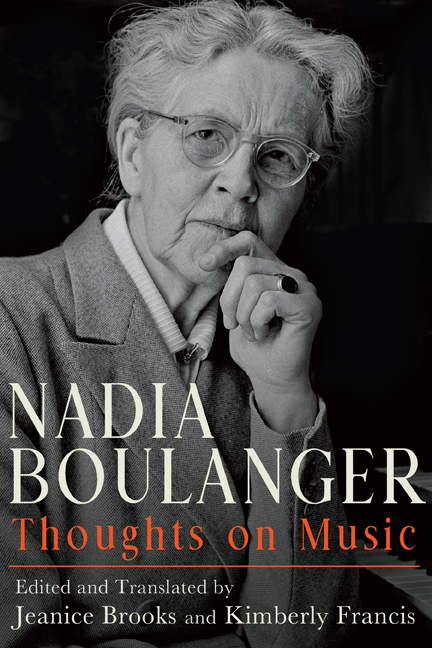Book contents
- Frontmatter
- Contents
- List of Illustrations
- Acknowledgments
- Editorial Apparatus and Critical Notes
- Note on Translations
- List of Abbreviations
- Timeline of Nadia Boulanger’s Life
- Introduction
- Part One Journalism, Criticism, Tributes
- Part Two Lectures, Classes, Broadcasts
- Bibliography of Nadia Boulanger’s Published Writing
- General Bibliography
- Index
“Fin de Saison” Spectateur 3, 109 (July 1, 1947): 6 (complete text)
Published online by Cambridge University Press: 15 October 2020
- Frontmatter
- Contents
- List of Illustrations
- Acknowledgments
- Editorial Apparatus and Critical Notes
- Note on Translations
- List of Abbreviations
- Timeline of Nadia Boulanger’s Life
- Introduction
- Part One Journalism, Criticism, Tributes
- Part Two Lectures, Classes, Broadcasts
- Bibliography of Nadia Boulanger’s Published Writing
- General Bibliography
- Index
Summary
Concerts Reviewed
(asterisk indicates premiere)
June 11, 1947
Concerto for Two Pianos, Percussion, and Orchestra, Béla Bartok
Chants d’espace, Yvette Grimaud*
Deux Poèmes, Pierre Boulez*
Le Livre des Eaux, L. A. Marcel*
June 16, 1947
Concerto for Two Violins, BWV 1043, Johann Sebastian Bach
Violin Concerto, D Major, op. 61, Ludwig van Beethoven
Violin Concerto, Béla Bartok*
June 18, 1947
Overture, Elegy, and Rondo, Sir Arnold Bax
Le Carnaval romain, “Ouverture caractéristique,” op. 9, Hector Berlioz
Piano Concerto, Alan Rawsthorne
Nocturnes, “I: Nuages”; “II: Fêtes”; “III: Sirènes,” Claude Debussy
And now our musical season ends. To what state is the audience reduced? You imagine it replete, saturated by … music, rendered indifferent by fatigue, and aspiring to nothing more than silence. Yet, the Palais de Chaillot could have been filled five or six times over for the Enescu-Menuhin concert. The Théâtre Champs-Élysées is full to bursting night after night. We rushed to the Bach Festival in Strasbourg; then we dashed to the concerts of French music at Versailles; people fought each other to hear Pelléas, they protested furiously against the sets, an unhappy error by a great artist, they discussed intently the acoustic balance, an error of a reliable musician, nonetheless. Certain virtuosos were acclaimed, others were kindly reminded that “Paris is not a training ground.” Performances, trends, and works are argued over. A new audience, not always daring to take a position, having perhaps still too much appetite to be able to choose, besides not knowing very well how to choose, nor why they should, but an audience eager to listen, at times capable of understanding, and often reacting with a marvelous intuition.
How has its final balance been established this year? Having been exposed to the best and the worst, almost without a transition, we have sometimes watched people seduced by vulgarity, weakened by mediocrity, indoctrinated by false prophets. They tried to make the audience confuse the “great” with the “big,” simplicity with poverty, sobriety with indifference. They tried to make people despise lightness, charm, gaiety, ease, moderation, pleasure, joy.
- Type
- Chapter
- Information
- Nadia BoulangerThoughts on Music, pp. 285 - 288Publisher: Boydell & BrewerPrint publication year: 2020



